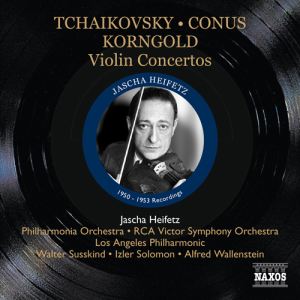 |
 |
|

Not available in the USA
alternatively
CD: MDT
AmazonUK
Sound
Samples & Downloads |
Pyotr Il’yich TCHAIKOVSKY
(1840-1893)
Violin Concerto in D major, Op.35 [30:32]
Julius CONUS (1869-1942)
Violin Concerto in E minor [18:21]
Pablo de SARASATE (1844-1908)
Zigeunerweisen, Op.20/1 [8:22]
Erich Wolfgang KORNGOLD (1897-1957)
Violin Concerto in D major, Op.35 [21:57]
 Jascha Heifetz (violin)
Jascha Heifetz (violin)
Philharmonia Orchestra/Walter Susskind (Tchaikovsky)
RCA Victor Symphony Orchestra/Isler Solomon (Conus), William Steinberg
(Sarasate)
Los Angeles Philharmonic Orchestra/Alfred Wallenstein (Korngold)
rec. July 1950, EMI Abbey Road Studio No.1, London (Tchaikovsky);
December 1952, United Artists Studios, Hollywood (Conus); June 1951
(Sarasate) and January 1953 (Korngold), Sound Stage 9, Republic
Pictures, Hollywood
 NAXOS HISTORICAL 8.111359 [79:12]
NAXOS HISTORICAL 8.111359 [79:12] 
|
|
|
Mention the name of Jascha Heifetz in certain circles and you're
still likely to hear the same half-baked clichés about
an excess of speed and shortage of soul. Now, from Naxos and
restoration wizard Mark Obert-Thorn, comes conclusive proof
to the contrary, if any were needed. Naxos’s invaluable
Heifetz series plants both feet in the 1950s, bringing us some
of his most sensitive and appealing recordings, including two
rarities in the Heifetz discography.
There's no doubt that Heifetz tempos occasionally verged on
self-parody. It comes as some surprise, then, to hear the room
afforded to the principal melody of the Tchaikovsky concerto
in this 1950 recording with Walter Susskind and the Philharmonia,
the second of his three studio recordings. It's still swift,
but Heifetz allows subtle flexibility and warm character to
colour the music. It's utterly lovely playing, with Heifetz's
cheekily smudged finger-work into the second theme [2:48] being
a particular highlight - although an errant chord from what
sounds like a harp, clearly plucked by accident, invades this
unaccompanied passage. One less appealing aspect of the recording
- as with all of his studio recordings of the work - is Heifetz's
inclusion of his (and Auer's) retouched virtuoso passages which,
thankfully, seem to have fallen by the wayside in recent decades.
They're totally unnecessary blemishes on the score and, when
hearing the meal that the normally faultless Heifetz makes of
the last of these 'improvements' [14:37], I'm at a loss to understand
why he chose to include them at all. In comparison with the
1937 EMI recording, with the London Philharmonic under John
Barbirolli (Naxos Historical 8.111359), I hear a greater intensity
of expression in this 1950 account, particularly in his rhapsodic
reading of the slow movement. The finale is a little less appropriately
capricious than the 1937 set, though Heifetz's exchanges with
the wind and cellos in the slower central section [from 2:33]
are wonderfully conversational. Even with the above caveats,
this is one of the major Tchaikovsky recordings and one of Heifetz's
most appealing performances.
He is imploringly persuasive in a less than memorable concerto
by Russian violin virtuoso Julius Conus. This work dates from
1898 and is oddly slanted towards the first movement, being
almost totally without a finale. Apparently a favourite of Heifetz's
teacher, Leopold Auer, it's picked up a few recordings over
the years and while it is a competent work - especially in the
singing solo line - there's a dearth of memorable thematic material
and some plodding orchestration, particularly in the tutti sections.
It tends towards a gloomy Russian angst, rather like Tchaikovsky
in Manfred mode. Heifetz makes the best possible case
for the solo part and both this, and the Sarasate Zigeunerweisen,
which follows, display his unmatched ability to sustain a long
line at maximum intensity. In the kitsch solemnity of Sarasate's
gypsy pastiche, Heifetz impresses holding the tension across
the almost involuntary flourishes which pervade the solo line.
Perhaps the most historically important document here is Heifetz’s
only recording of Korngold’s Violin Concerto. Heifetz
pressed Korngold to complete the concerto, which had been started
some years before with another violinist in mind. The result
is a fitfully appealing work firmly rooted in Korngold’s
Hollywood style. It seems a perfect match for Heifetz’s
hyper-suave sound. Typically intense, he is sweet but urgent
at the concerto’s outset, though I yearned for something
gentler in the second theme. There are issues of production,
however, which detract. The balance between soloist and orchestra
in the finale reduces the orchestra to a distant supporting
role, as though they are playing in the next room, presenting
nothing like a realistic concert balance. That’s not to
say, however, that Mark Obert-Thorn has done anything other
than a fine job with these transfers, which tend to have a greater
depth than those in RCA’s Heifetz Collection, released
in the mid-1990s. Tully Potter’s expert liner-notes round
off a valuable and hugely enjoyable issue.
Andrew Morris
see also review by Jonathan
Woolf
|
|




 All Nimbus reviews
All Nimbus reviews








